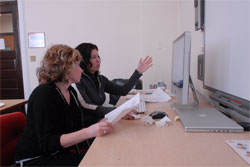TC Gets Its Game Jam On
A computer game with the unlikely name of Gandhi Gandhi Boom Boom reigns supreme at Teachers College. Gandhi Gandhi, developed by a team that included Teachers College student Rosanna Lopez and alumna Traci Lawson, was one of nearly a dozen created at the College as part of the first annual Global Game Jam, an intense, 48-hour competition in which people in 54 locations throughout the world worked nonstop in hopes of creating the ultimate computer game.
"[Computer games] are an important and influential form of media with the potential to reach a lot of people and to engage them voluntarily in the learning process," said event organizer Jessica Hammer, who teaches game design in TC's Computing, Communications and Technology in Education (CCTE) program. "The motivational and engagement aspects are important all by themselves, but there's more to games than simple popularity. I believe that games can teach differently from other forms of media. Just as you'd use a lecture, a book or a movie to teach different things, there are some kinds of learning a game can deliver really well."
The competition began at 5 p.m. Friday, January 30, and ended at 5 p.m., Sunday, February 1. Eleven teams assembled in Grace Dodge Hall on Friday and quickly began brainstorming. The rules were simple: Produce a game from scratch that incorporated the event's theme ("As long as we have each other, we'll never run out of problems.") and three adjectives (illusionary, pointed, persistent).
Tech newcomers and pros alike labored in the glare of their computer screens, sustaining themselves on soda, pizza or other caffeinated drinks and snack foods. They worked in shifts, many choosing to sleep on the floor as their partners programmed into the wee hours of the morning.
One team, largely made up of CCTE students, had lofty ambitions. With their game, called Skitzo, they wanted to address the limits of institutions in accommodating persons with mental or physical disabilities. In theory, a player would inhabit the role of Skitzo, the game's schizophrenic protagonist, and set about exploring public places-'"the office, public transportation, a party-'"while learning how to deal with schizophrenic behavior.
"One of our goals is to create compassion and awareness for people with special needs-'"to experience other people's realities," said Pazit Levitan, a third-year CCTE doctoral student. "I'm not a game designer, but since taking Jessica's course I became so intrigued with the innovative element of purposeful design, that I've incorporated it into my research."
At 5 p.m. on Sunday, the gamers rolled up their sleeping bags and lugged headed to the Cowin Center for judging. One by one, each of the 11 teams presented their hasty creations to their peers and judges.
Puzzle games garnered the most praise from the judges. The most polished of the competition was the ethereal Klish (pronounced KUH-Lish), which its creators described as a game that "mimics and echoes the quiet beauty of nature and technological discovery."
What is is Not, a physics-based game, finished runner-up by cleverly appropriating MC Escher-type negative space aesthetics to create a game reminiscent of popular game Crayon Physics.
In the end, though, it was the off-beat Gandhi Gandhi Boom Boom that took best of show. It's a puzzle game where opposites like bombs and peace symbols, cats and dogs, and Gandhis and hamburgers are persistently drawn to each other. The player's responsibility is to keep opposites from colliding while matching similar items on the digital field of play. It's a frenetic game that does require ample amounts of persistence, so much so that it earned its creators a trip to San Francisco for the Game Developers Conference in March.
Gandhi Gandhi Boom Boom is available as a free download (http://globalgamejam.org/games/gandhi-gandhi-boom-boom-0), as are many of the 360 games developed by participants around the world, at the Global Game Jam Web site.
Published Thursday, Feb. 19, 2009


